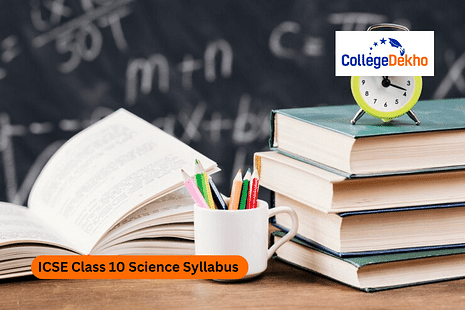- ICSE Class 10 Science Syllabus 2024-25 PDF
- How To Download ICSE Class 10 Science Syllabus 2024-25?
- ICSE Class 10 Physics Syllabus 2024-25
- ICSE Class 10 Chemistry Syllabus 2024-25
- ICSE Class 10 Biology Syllabus 2024-25
- Benefits of Knowing the ICSE Class 10 Science Syllabus
- ICSE Class 10 Science Syllabus 2024-25: Preparation Tips
- Faqs


Never Miss an Exam Update
ICSE Class 10 Science Syllabus 2024-25
is divided into three parts. Students have to study Physics, Chemistry, and Biology and appear for their exams separately. For each of the exams, students will get 2 hours to solve the questions. The theory paper for each of the subjects will be conducted for 80 marks and 20 marks will be given for internal assessment. Physics and Biology consists of 6 units and Chemistry includes 9 units. In addition, there will be an internal assessment too. Students can also check the marks allotted to them and pay attention to the units accordingly. They can devote more time to the topics with high marks.
AlsoRead -
ICSE Class 10 Syllabus 2025 for all Subjects
To enhance the score, students should also prepare for the practical exams. A good performance in practicals will help students to score high marks. Read the article in detail to check the latest information about the ICSE Class 10 Science Syllabus 2024-25.
Also Read -
ICSE 10th Exam Pattern 2025
ICSE Class 10 Science Syllabus 2024-25 PDF
Students can download the PDF of the ICSE Class 10 Science Syllabus 2024-25 from the direct link given below:
How To Download ICSE Class 10 Science Syllabus 2024-25?
To download the ICSE Class 10 Science Syllabus 2024-25, students can follow the simple steps given below:
- Step 1: Students will first have to visit the official website of CISCE at cisc.org
- Step 2: The homepage will open. Now, click on the Examinations option present on the menu bar.
- Step 3: Now, click on the ICSE Examination.
- Step 4: Scroll down and click on Regulations And Syllabuses on the new page.
- Step 5: Now, click on the option called Regulations And Syllabus - ICSE 2025
- Step 6: The list of syllabi will open on your screen.
- Step 7: Click on the Physics, Chemistry, or Biology option to download the PDF.
ICSE Class 10 Physics Syllabus 2024-25
Students can check out the important information about the Physics syllabus in the science stream from the table given below:
UNIT | Sub Unit | Marks |
|---|---|---|
1. Force, Work, Power and Energy | (i) Turning forces concept; moment of a force; forces in equilibrium; centre of gravity. (ii) Uniform circular motion (iii) Work, energy, power and their relation with force. (iv) Different types of energy. (v) Machines as force multipliers. (vi) Principle of Conservation of energy. | |
2. Light | (i) Refraction of light through a glass block and a triangular prism. (ii) Total internal reflection. (iii) Lenses (converging and diverging) including characteristics of the images formed (using ray diagrams only). (iv) Using a triangular prism to produce a visible spectrum from white light; Electromagnetic spectrum. | |
3. Sound | (i) Reflection of Sound Waves; echoes: their use; simple numerical problems on echoes. (ii) Natural vibrations, Damped vibrations, Forced vibrations and Resonance - a special case of forced vibrations. (iii) Loudness, pitch and quality of sound. | |
4. Electricity and Magnetism | (i) Ohm’s Law; concepts of emf, potential difference, resistance; resistances in series and parallel, internal resistance. (ii) Electrical power and energy. (iii) Household circuits (iv) Magnetic effect of a current (principles only,statement of laws not required); electromagnetic induction (elementary). | 80 |
5. Heat | (i) Calorimetry: meaning, specific heat capacity; principle of method of mixtures; Numerical Problems on specific heat capacity using heat loss and gain and the method of mixtures. (ii) Latent heat; loss and gain of heat involving change of state for fusion only. | |
6. Modern Physics | (i) Radioactivity and changes in the nucleus; background radiation and safety precautions. (ii) Nuclear fission and fusion; basic introduction and equations | |
INTERNAL ASSESSMENT Practical Work | 20 | |
TOTAL | 100 | |
ICSE Class 10 Chemistry Syllabus 2024-25
Students can check out the important information about the Chemistry syllabus in the science stream from the table given below:
UNIT | Sub Unit | Marks |
|---|---|---|
1. Periodic Properties and Variations of Properties - Physical and Chemical. | (i) Periodic properties and their variations in groups and periods. (ii) Periodicity on the basis of atomic number for elements. | |
2. Chemical Bonding | (i) Electrovalent bonding. (ii) Covalent Bonding. (iii) Coordinate Bonding. | |
3. Study of Acids, Bases and Salts | (i) Simple definitions, classification and their characteristic properties. (ii) Ions present in mineral acids, alkalis and salts and their solutions; use of litmus and pH paper to test for acidity and alkalinity. (iii) Definition of Salts, Types of salts: normal salts, acid salt, basic salt, definition and examples. (iv) Action of dilute acids on salts. (v) Methods of preparations of normal salts with relevant equations | |
4. Analytical Chemistry | (i) Action of Ammonium Hydroxide and Sodium Hydroxide on solution of salts. (ii) Action of alkalis (NaOH, KOH) on certain metals, their oxides and hydroxides. | |
5. Mole Concept and Stoichiometry | (i) Gay Lussac’s Law of Combining Volumes (iii) Refer to the atomicity of hydrogen, oxygen, nitrogen and chlorine (iii) Vapour Density and its relation to relative molecular mass. (iv) Mole and its relation to mass. (v) Simple calculations based on chemical equations | 80 |
6. Electrolysis | (i) Electrolytes and non-electrolytes. (ii) Substances containing molecules only, ions only, both molecules and ions. (iii) Definition and explanation of electrolysis, electrolyte, electrode, anode, cathode, anion. (iv) An elementary study of the migration of ions, with reference to the factors influencing selective discharge of ions. (v) Applications of electrolysis | |
7. Metallurgy | (i) Occurrence of metals in nature. (ii) Extraction of Aluminium. (iii)Alloys – composition and uses. (iv) Stages involved in the extraction of metals | |
8. Study of Compounds | (i) Hydrogen Chloride (ii) Ammonia (iii) Nitric Acid (iv) Sulphuric Acid | |
9. Organic Chemistry | (i) Introduction to Organic compounds. (ii) Structure and Isomerism. (iii)Homologous series – characteristics with examples. (iv) Simple nomenclature. (v) Hydrocarbons: alkanes, alkenes, alkynes. (vi) Alcohols (vii) Carboxylic acids | |
INTERNAL ASSESSMENT Practical Work | 20 | |
TOTAL | 100 | |
ICSE Class 10 Biology Syllabus 2024-25
Students can check out the major information about the ICSE Class 10 Biology Syllabus 2024-25 from the table given below:
UNIT | Sub Unit | Marks | |
|---|---|---|---|
1. Basic Biology | (i) Cell Cycle and Cell Division. (ii) Structure of chromosomes. (iii) Genetics: Mendel’s laws of inheritance and sex-linked inheritance of diseases. | 80 | |
2. Plant Physiology | (i) Absorption by roots, imbibition, diffusion and osmosis; osmotic pressure, root pressure, etc. (ii) Transpiration - process and significance. Ganong’s potometer and its limitations. (iii) Photosynthesis. (iv) Chemical coordination in Plants. | ||
3. Human Anatomy and Physiology | (i) Circulatory System. (ii) Excretory System. (iii) Nervous system (iv) Endocrine System: General study of the following glands: Adrenal, Pancreas, Thyroid and Pituitary. (v) The Reproductive System. | ||
4. Population | Population explosion in India; need for adopting control measures - population control. | ||
5. Human Evolution | Basic introduction to Human evolution and Theories of evolution: Lamarck’s theory of inheritance; Darwin’s theory of evolution by natural selection. | ||
6. Pollution | (i) Types and sources of pollution; major pollutants. (ii) Biodegradable and Non-biodegradable wastes (iii)Effects of pollution on climate, environment, human health and other organisms; control measures. | ||
INTERNAL ASSESSMENT Practical Work | 20 | ||
TOTAL | 100 | ||
Benefits of Knowing the ICSE Class 10 Science Syllabus
Primarily, students should have a good idea about the syllabus as the subject is divided into three parts - Physics, Chemistry, and Biology. Knowing the syllabus in advance helps students to prepare the subject and perform better in the exam. Some of the benefits of knowing the Science syllabus are as follows:
Comprehensive knowledge of all topics: When students know the names of topics to be covered, they can make a study plan. The students can equally focus on each of the chapters while studying.
Knowledge of Marks: Through the syllabus, students can know the marks allotted to each of the topics. According to it, students can prioritize the topics and focus more on the topics with high weightage.
Build Confidence in Preparation: When students know the syllabus in detail, they can manage to study topics as per their convenience. Gaining knowledge helps in building great confidence and students are also able to perform better.
Organize Time - Students can divide the syllabus into small parts and complete them in time. They should prepare a study routine and follow it to complete the syllabus in advance.
Revision -
When students are able to complete the syllabus beforehand, there is sufficient time for revision. The students can quickly revise all the chapters and ensure all topics are clear to them.
Also Read -
ICSE Class 10 Previous Year Question Paper
ICSE Class 10 Science Syllabus 2024-25: Preparation Tips
Following are some of the essential preparation tips for ICSE Class 10th Science.
Make a Study Plan: Students should first go through the syllabus and divide the syllabus for Physics, Chemistry, and Biology into smaller parts. Following the routine, students will be able to complete the syllabus and get in-depth knowledge of all topics.
Note Important Theorems in Your Notebook: Students are suggested to note down the important theorems in their own words. This will help in better understanding of the concepts and provide good retention.
Focus on Solving Application-Based Questions: Students should practice application-based questions that improve problem-solving skills. This will enable them to solve questions in the board exams.
Practice Online Questions: After completing the questions, students should start practicing questions online. By answering the questions, students learn to solve a variety of questions.
Practice Writing Questions:
Students should always write questions. It helps in providing an idea about the key points to be added in long questions. Students also learn to write answers in an effective way that fetches high marks.
Also Read -
ICSE 10th Preparation Tips 2025
ICSE Class 10 Science Syllabus 2024-25 is stated here separately for Physics, Chemistry, and Biology for the help of the students. Download the PDF stated above and start your preparations for the board exams.
FAQs
To complete the ICSE Class 10 Science Syllabus 2024-25, try to plan out your studies with a systematic study plan. Map out your preparations so that you complete your syllabus at least one month prior to the board exams. Study in small sessions every day.
ICSE Class 10 Biology Syllabus2024-25 includes chapters like Basic Biology, Plant Physiology, Human Anatomy and Physiology, Population, Human Evolution and Pollution. The exam will be conducted for 80 marks.
ICSE Class 10 Chemistry Syllabus 2024-25 includes chapters like Periodic Properties and Variations of Properties - Physical and Chemical, Chemical Bonding, Study of Acids, Bases and Salts, Analytical Chemistry, Mole Concept and Stoichiometry, Electrolysis, Metallurgy, Study of Compounds and Organic Chemistry.
ICSE Class 10 Physics Syllabus 2024-25 includes chapters like Force, Work, Power, and Energy, Light, Sound, Electricity and Magnetism, Heat, and Modern Physics. The paper will be conducted for 80 marks.
Was this article helpful?














